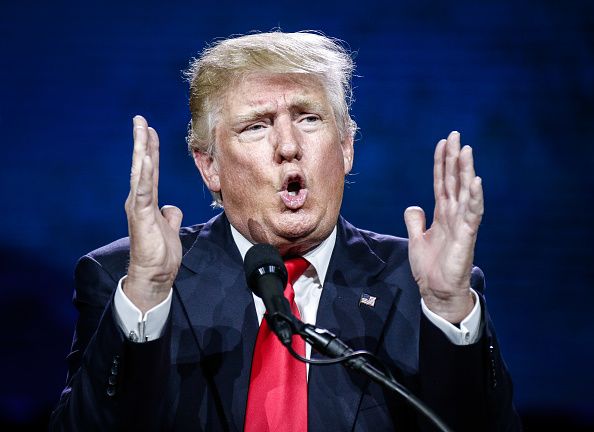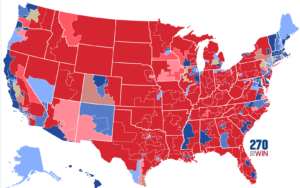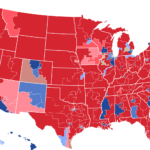Napoleon Bonaparte once said that “men are moved by two levers only: fear and self-interest,” and Donald Trump, arguably the most contentious figure in world politics, has built his campaign around a similar belief. The human equivalent of country music–some love him, others hate him. Despite his recurring, pathologically ingrained tendencies and revelations of his shady enterprises, Trump understands the power of fear, and the way in which it influences our decisions.
This year has seen fear-mongering hit new heights, both in the U.S. and overseas. Paradoxically perpetuated by a crippling culture of political correctness, fear, like anger, is a forceful motivator, one that can inspire acts of bravery and acts of unbelievable cruelty.
A Reactionary Response to Political Correctness
A universally relatable phenomenon, fear is a necessary tool for effective demagoguery, and Donald Trump is fully strapped. Displaying a penchant for hateful, dictatorial rhetoric, Trump’s tyrannical tendencies exert a profound influence over his submissive subjects, otherwise know as his supporters. A truly talented demagogue gains power by appealing to emotions rather than logic, often awakening inner prejudices that we never knew existed. The USA’s history of demagoguery has largely revolved around race, with particular animosity reserved for African-Americans. Trump recognizes that demagoguery, if used cleverly enough, can transcend race and he has aroused disdain for the rich, although he is “incredibly rich” himself, disdain for liberals, disdain for Muslims, Hispanics, Hillary Clinton, the media, and proponents of political correctness. Though clearly lacking any real concrete solutions to economic issues and oversea conflicts, he deflects attention away from these deficiencies by seeking to turn the majority, mostly white people, against minorities. By politicizing the uncertainty of the unknown, Trump has exploited and profited from visceral fear in the process.
No one individual has a monopoly on demagoguery, but during the recent GOP nomination battle, you would be forgiven for thinking otherwise.
Attempting to create further unease within the American population by predicting a bleak future under Mrs. Clinton, Trump capitalizes upon the fear associated with an unpredictable future. Clinton’s ties with Wall street threaten the nation’s financial security, he says, and her inability to figure out the whole email server thing jeopardizes the security of every American. Trump wants to make America great again, after all, and he is not prepared to passively watch as China continues to dominate the economical landscape, or so he promises. Oscillating widely between supposed threats to our lives and threats to our economic futures, a demagogue’s “playlist” used to be as predictable as the plot of an Adam Sandler movie, but Trump has deviated from the “norm.”
Since the Brexit vote, the Dow Jones industrial average has risen and fallen in an erratic manner, and the British economy may yet collapse. The U.S. government, according to Trump, is merely exacerbating these woes by recklessly wasting billions of dollars. The presumptive Republican nominee continuously talks about the national debt, which is the amount owed, as a nation, to various creditors around the world.
As of this writing, according to usgovernmentdebt.us, the gross US federal government debt is estimated to be $19.3 trillion. How much is $19.3 trillion? A trillion dollars stacked would equate to a money tower roughly 100 kilometers high. $19.3 trillion would build close to one thousand nuclear power plants. In less specific speak, times ahead look tough, very tough.
The economic crisis of 2008, and the unparalleled spending that followed, provided Republicans with the perfect platform to attack President Obama, repeatedly and unfairly. Although the president did his utmost to steer the U.S. away from further financial hardships, Trump wishes to paint the American political economy as the Titanic. Under a Clinton captaincy, there will be no lifeboats, and the blue collar workers will experience nothing but ice-cold water immersion.
Trump, a poster boy for erroneous economics, prompted President Obama into embarking upon a “myth-busting” mission. And the facts, something Trump usually avoids, support Obama’s belief that he and his team pulled the economy back from the brink, because when the 44th President of the United States assumed his duties, the unemployment rate was soaring. The White House responded by injecting hundreds of billions of federal dollars into the economy. Even though the economy has improved dramatically, Republicans, especially Trump, have been unwilling to give Obama an ounce of credit.
Instead, Trump claims that Obama is merely doing all in his power to help Hillary Clinton, selling a weak presidential record as if it were a success story in the process. As we have seen, Trump’s claims have stoked a burning fire, with many of his supporters failing to see that they lend support to a man that is largely anti-government, anti-immigrant, anti-trade and, if we’re being blunt, anti-progression. As he purposely fails to acknowledge an improving economy, Trump tells America that government spending is squeezing the middle class.
Largely because of Republican resentment for the current establishment, opposition to the president has been unrelenting and largely unwarranted.
Recent history tells us that the Republican party benefits from a population that is terrified by the future–for example, the war in Iraq and the continued imprisonment of many without basic rights at Guantanamo Bay. When Trump speaks, it is virtually impossible to sift through the vitriolic rhetoric and find rational policy proposals to support. Fear, especially when it’s justified, has a strong tendency to cloud our rationale, and it makes impulsive, reactionary responses more attractive. While Clinton calls for sober, methodical thinking, Trump instead opts for the most emotional, simplistic solution possible.
There is no question that the economic shift, along with a transition to green energy, has negatively affected many Americans. This anger clouds perspective, with hope making way for despair. But America’s greatest hope does not rest with Trump and the dystopian future that he, if given the opportunity, will most definitely create. This glaring reality is acknowledged by millions, however, it has also been ignored by millions, either knowingly or otherwise. When others, especially those who abhor the current regime, see a man like Trump not just defy political correctness but thrive because of doing so, they are enlivened. They are tempted to defy it, too, and some will, as we saw at Trump’s rally in San Jose, California last month. The ripples from one act of defiance, of one instance of saying something many crave to say, can reach far. There are few other things the PC police fear more than open defiance, and for valid reasons. After all, it is their most obvious weakness, and Trump has exposed this like no other Republican candidate in the history of American politics.
Main Photo:













